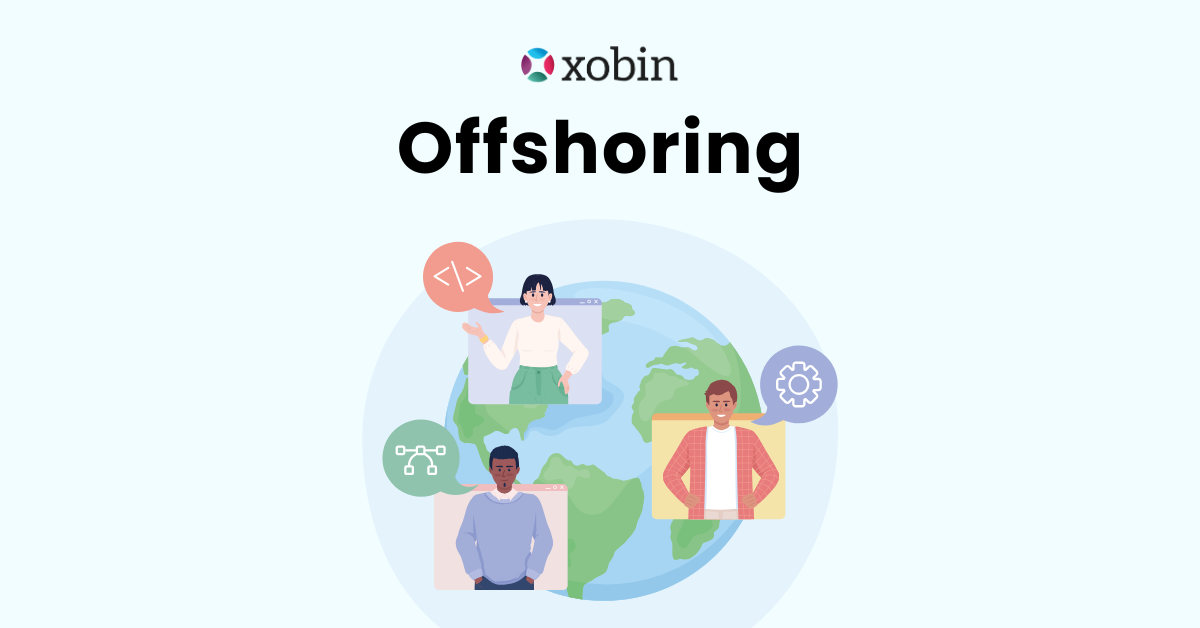XOBIPEDIA
HR Glossary

What is Offshoring?
Offshoring refers to the process of setting up the operations of a business in a different country to minimize costs.
It means a company sets up its operations overseas where they can get cheap labor and resources so as to minimize their production or any other costs.
Offshoring countries are usually developing nations as they provide access to cheap labor and resources.
Types of Offshoring
There are two types of offshoring which are as follows-
Services Offshoring
Refers to setting up an overseas business unit for the purpose of carrying out service-based operations. For eg: customer care, marketing, information technology, etc. It helps the company is focussing on its primary work while offshoring the other services at lower costs.
For eg: a web development company has set up their accounting and marketing operations in a different country with cheaper costs.
Product Offshoring
Refers to setting up a manufacturing unit in a different country in order to cut costs. The purpose behind this is to reduce the manufacturing costs by getting cheap labor and resources and afterward sell the finished goods in their domestic or international markets.
For eg: A U.S. automobile company sets up its manufacturing unit in India to take the advantage of cheap labor.

Advantages and Disadvantages of Offshoring
Advantages of Offshoring are-
- Allows you to minimize your costs and leave you with higher profits. All this will help you in the growth of your business.
- It provides 24*7 support to its clients. With the operations in different countries, you get the opportunity for greater availability of staff at all times.
- This provides you with a talented pool of employees. The overseas operations also come with the advantage of a greater pool of talented employees that helps in business growth.
- Unlike outsourcing, allows you to maintain full control of operations. All the people, no matter what country, are working under your company name.
Disadvantages of Offshoring are-
- The communication barrier is a major disadvantage of offshoring. Offshoring leads to imperfect communication, due to the language barrier.
- Proximity is one of the major disadvantages of offshoring. Since offshoring companies are situated in different countries, the proximity and the time difference disrupt the flow of work. It gets difficult to get them on-ground reports since you cannot physically visit the placer. Also, work schedules need to be adjusted to have meetings with people from offshore companies due to the time difference.
- Political unrest in the offshoring country can be of harm to the company. Offshoring companies are mostly from developing nations and may or may not have any chance of political unrest.
- Cultural differences play a major part in offshoring. Since companies set their operations in a whole different country, they have to work according to the culture of that country itself. The working style might differ in the two countries, but it needs to be adjusted accordingly
How is Offshoring Different From Outsourcing?
Offshoring and outsourcing are two terms that are often considered the same and people often get confused between the two. However, there is a major key difference between them that sets them apart.
Outsourcing refers to a company contracting out a process to some third party. It means that a company hires an external organization to take care of something in which they specialize.
Offshoring on the other hand is setting up a place of operations in a different country under the same name.
Outsourcing helps the companies in getting advantage of the skilled labor and gets the work done in a more efficient way.
Offshoring helps the companies cut costs by minimizing the labor and resources costs. It gets them access to a skilled and talented bunch of people from all around the globe.
These were some of the key differences between them.
We hope this blog helped you get some clarity about the topic. For more such insightful blogs;

Recommended Content

Video Interviews can simplify your hiring
Don’t let a packed schedule be a hindrance in recruitment. Use structured interviews with the power of video to screen applicants. Understand the communication skills, motivation, and job skills using video interviews.

Pre-employment Testing: The Complete Guide
Move over from pen-paper based tests and manually checked assignments to pre-employment assessments. Democratize your organization hiring by screening for skills before you interview.

How can Employers adapt to Remote Hiring
With most jobs going remote, your best applicants could be in Melbourne or Miami. From remote screening and virtual interviews to remote onboarding, Learn the best practices to get started.


